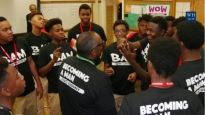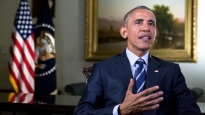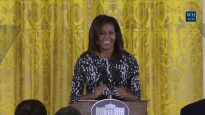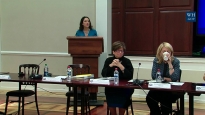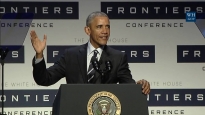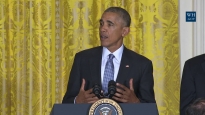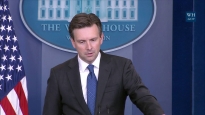Signing Export-Import Bank Reauthorization
May 30, 2012 | 11:06 | Public Domain
President Obama signs the Export-Import Bank Reauthorization Act of 2012, which will reauthorize the Bank to continue financing U.S. exports and ensure a level playing field for U.S. businesses at no cost to American taxpayers.
Remarks by the President at Export-Import Bank Bill Signing
South Court Auditorium
11:35 A.M. EDT
THE PRESIDENT: Thank you. (Applause.) Thank you very much. Everybody, please have a seat. Have a seat. I want to begin by recognizing the members of Congress who are here today. All of them did outstanding work on this legislation. In particular, I want to thank Steny Hoyer, Congresswoman Maloney, as well as Congressman Miller, who helped to make this day possible. Their leadership, their hard work made this bill a reality.
We’ve talked a lot recently about the fundamental choice that we face as a country. America can either settle for an economy where just a few are doing well and a lot of folks are struggling to get by. Or we can build the kind of economy where everybody is getting a fair shot and everybody is doing their fair share, and everybody is playing by the same rules.
And part of building that broad-based economy with a strong middle class is making sure that we’re not just known as a nation that consumes. We’ve got to be a nation that produces, a nation that sells. Our middle class was created by workers who made and sold the best products in the world. Our communities and our economy have always done better when we shipped more goods than anybody else, stamped with that phrase: “Made in America.” And I want us to be that nation again. I want us to be that nation in perpetuity.
Two years ago, I set a goal of doubling American exports over five years. Today, with the trade agreements that we’ve signed into law, with the help of some of these same members of Congress, we’re making historic progress. Soon, there are going to be millions of new customers for our goods and services in Korea, in Colombia and Panama. That way, even though we got some Hyundais over here, we’re also going to have some Chryslers and Fords and Chevys in Seoul that are imported from Detroit and Toledo and Chicago.
So I’m going to go anywhere I can in the world to create new markets for American goods. And we’re also not going to stand by when our competitors aren’t following the rules. We’ve brought trade cases against China at nearly twice the rate of the previous administration. We’ve set up a Trade Enforcement Unit to investigate unfair trade practices that are taking place anyplace -- anywhere in the world. Anytime other countries skirt the rules or put our workers and our businesses in an unfair position, we’re going to take action.
We’re also making sure that American businesses have better access to the 95 percent of the world’s consumers who live beyond our shores. And that’s why the bipartisan bill that I’m about to sign is so important. By reauthorizing support for the Export-Import Bank, we’re helping thousands of businesses sell more of their products and services overseas and, in the process, we’re helping them create jobs here at home. And we’re doing that at no extra cost to the taxpayer.
Over the past few years, I’ve met with a lot of business leaders and a lot of workers across America, from companies like Boeing to Dow Chemical to smaller companies that are also interested in accessing foreign markets. And they’ve told me how critical support from the Ex-Im Bank has been in competing more effectively in the global marketplace. As the head of the bank, we owe our thanks to Fred Hochberg, who is here on stage, for doing such an outstanding job.
Just to give you a couple of examples, Boeing relied on support from the Ex-Im Bank to strike a deal selling more than 200 planes to one of the fastest-growing airlines in the world. And that translates into thousands of jobs here in the United States. As long as our global competitors are providing financing for their exports, we’ve got to do the same. So I’m glad that Congress got this done. I’m grateful to members of both parties who came together and put the interests of the American people first.
Now we’ve got to do more. Obviously, the world economy is still in a delicate place because of what’s going on in Europe and the fact that some of the emerging countries have been slowing down. It is absolutely critical for us to make sure that we are full speed ahead.
I’ve been traveling around the country talking about a “To-Do” list for Congress with some commonsense ideas that historically have had bipartisan support to help continue growth and job creation. And just like the bill I’m about to sign, those policies can help strengthen the economy and put more folks back to work. We shouldn’t have to wait until an election to do some of this business.
A couple of points. Number one, it still makes no sense for us to be giving tax breaks to companies that are shipping jobs and factories overseas. The great news is there are a lot of companies that are now thinking about insourcing and moving jobs back to the United States. We are more competitive than ever. Our workers are more productive than ever. We want to help provide incentives for folks to make those decisions. So it's time for Congress to take tax breaks away that allow for deductions moving jobs overseas and instead cover moving expenses for companies that are interested in bringing jobs back to America.
Number two, Congress should give every responsible homeowner the opportunity to save an average of $3,000 a year by refinancing their mortgage. We're starting to see a little bit of stabilizing in some of the housing markets around the country, but that continues to be a significant drag on our economy. But when families are able to take advantage of these historically low rates, it makes a difference. It puts money in their pockets or it may help them rebuild some of their equity. It gives them more confidence and the housing market stabilizes further.
We've done everything that we can do administratively to help some portion of homeowners around the country refinance. But every responsible homeowner in America should have a chance to save money. That's not just good, by the way, for the housing industry, that's good for all businesses, because it means consumers are going to be out there with a little extra money in their pockets.
Number three, Congress still has the opportunity to do more to help small business owners who create most of the new jobs in America. So we want to give them a tax break for hiring more workers and providing those workers higher wages.
Fourth, Congress should extend the tax credits for clean energy companies that are set to expire at the end of the year. This is something that a lot of members, both Democrats and Republicans, should be able to appreciate, because wind power, solar power, biofuels -- those aren't partisan issues -- that's a job sector that is growing across the country. But right now, there is too much uncertainty because we haven't gone ahead and locked down some of these tax credits.
These companies are putting folks back to work and they're helping us break our dependence on foreign oil. There are members, again, of both parties that support these tax credits. And tens of thousands of jobs are at stake. So I think it's very important for us to make sure that we move forward on that.
Fifth -- and I’m going to speak to this on Friday -- Congress should create a Veterans Job Corps so we can put our returning heroes back to work as cops and firefighters and park rangers. We just observed Memorial Day, an extraordinarily moving Memorial Day -- we were down at the Vietnam Veterans Memorial commemorating 50 years since that difficult and challenging war. And one thing we learned from that was that we’ve got to treat our heroes with the respect and dignity that they have earned.
And our veterans are some of the most highly-trained, highly-educated, highly-skilled workers we’ve got. These are Americans who want to keep serving now that they’re back. So we’ve got to make sure when they come home, they come home to new jobs and new opportunities. So there are a number of things that my administration can do on our own and we’re going to keep on doing them, but it gets a whole lot easier if we get some help from Congress. And this is a great example, a great model of what can happen.
America has come through some tough times together, and it’s going to take more time than any of us would like to get to a place where all of us have fully recovered from the worst recession in our lives. There will continue to be hurdles and there will continue to be some headwinds that we can’t fully control, but there are plenty of things we can control. And there are plenty of solutions within our reach. There are steps that we can take right now to speed up this recovery, to help create jobs, to restore some of the financial security that families have lost. It’s within our control to do the right thing and do it now.
So my message to Congress is thank you and congratulations on authorizing Ex-Im Bank to continue on its extraordinary mission. We’ve got more work to do. I hope this ends up being a model for the kind of progress that we can make in the months to come and the years to come. So with that, it is my great pleasure to sign this bill into law. (Applause.)
(The bill is signed.)
END
11:48 A.M. EDT
|
October 17, 2016
|
October 15, 2016
|
October 14, 2016
|
October 14, 2016
|
|
October 13, 2016
|
October 12, 2016
|
October 12, 2016
|
October 11, 2016
|
- &lsaquo previous
- …
- 14
- 15
- 16
- 17
- 18
- 19
- 20
- 21
- 22
- …
- next &rsaquo
